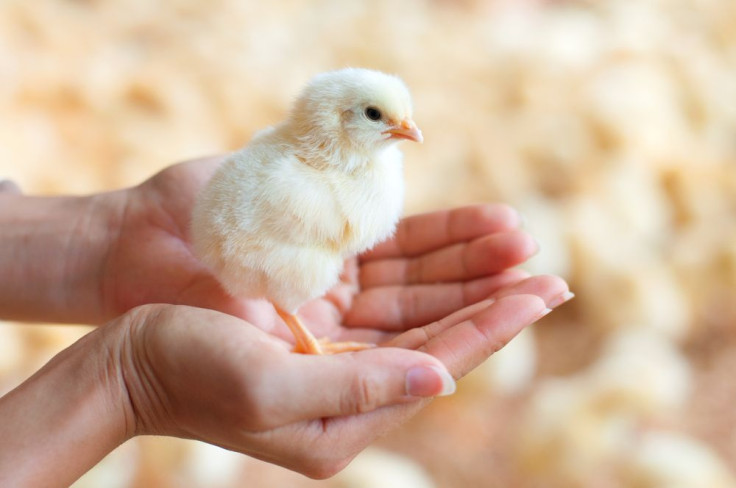Many US Salmonella Infections Arise From Keeping Live Chickens As Pets, But They Don't Have To Make You Sick

Of the nearly 200 Salmonella poisoning cases that have been reported throughout the U.S. by June 29, an alarming 86 percent have been linked to direct contact with live chickens and other poultry. While the Centers for Disease Control and Prevention recommends that the public avoid contact with chickens to prevent this outbreak from spreading, for those who aren’t quite willing to part ways with their feathered friends, there are more effective ways to ensure you and your family’s safety.
Salmonella is a somewhat common type of bacteria that causes food poisoning when ingested. Most individuals with Salmonella poisoning will develop fever and abdominal cramps, but according to the CDC, around 450 deaths in the U.S. are attributed to this infection each year. According to a report released by the CDC earlier this month, as of late June, there have been 181 people in 40 states infected with outbreak strains of Salmonella. Although there have been no deaths, 33 individuals have been hospitalized for their symptoms.
As reported by Tech Times, interviews with the sick revealed that contact with chickens, ducks, and other live poultry were at the root of around 86 percent of cases the CDC investigated. The agency is now calling for more hygienic housing and handling of pet birds in order to prevent the outbreak from spreading further.
Salmonella can be contracted two ways: by eating undercooked, infected meat or by touching infected feces and putting your fingers in your mouth. Individuals that keep poultry as pets can protect themselves and their families from contracting a Salmonella infection by ensuring the birds live in an outdoor coup rather than inside the house. Bird owners are also advised to wash their hands after handling the animals and to make an effort to wash anything in the area where the bird roamed.
Also, no matter how adorable you may find their feathery little heads, please refrain from kissing your chickens. According to the CDC, “Many ill people in these outbreaks reported bringing the live poultry into their homes, and others reported kissing or cuddling with the live poultry. These behaviors increase a person’s risk of a Salmonella infection,” Vox reported.
The CDC also hopes that stores which sell chicken supplies take a hand in educating the public on bird safety. The organization recommends that mail-order hatcheries, agricultural feed stores, and shops that sell or display live poultry should provide health-related information to current and potential bird owners.
Unfortunately, Salmonella outbreaks and chickens are not a new phenomenon. A similar outbreak occurred in 2014, sickening a total of 430 people from 23 states and Puerto Rico. While Salmonella poisoning is reported each year in individuals of all ages, the very young and very old are at slightly increased risk of falling ill. For those who don’t keep live chickens, Salmonella poisoning can be best avoided by ensuring that you only eat fully cooked chicken and egg products and wash hands, utensils, and surfaces after preparing dishes that involve raw meat. Also, birds aren’t the only pets linked to the nasty infection; pet reptiles are perhaps the most at-risk household pet for the infection, especially among young children.
Published by Medicaldaily.com



























